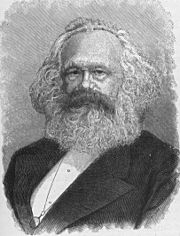Marx and Human History


My previous post on how pervasive child labour still is got me thinking about Karl Marx. Marx occupies a very important place in the history of political thought. I myself am not a Marxist but I believe Marx’s work warrants serious consideration. When I teach Marx to my first and second-year students we focus primarily on the normative dimensions of Marx’s writings, especially his account of exploitation and alienation. But today I wish to focus on what I see as the sophisticated empirical theses of Marx’s account of historical materialism. These are theses that I believe are still apt today and provide us with interesting insights into humanity’s struggle to overcome our naturally arduous condition.
According to Marx, “productive forces”- the means of production (e.g. tools and machines) and labour power (e.g. knowledge, skill, etc.)- are the real driving force behind human history. And I think this is probably correct, though I don’t think capitalism will be (nor need be) replaced by communism. The productive forces determine the relations of production -who has *effective control* over their labour power, the means of production, etc. - which in turn determine the *superstructure* of society (e.g. legal and political institutions). My thoughts on Marx’s historical materialism are published in my paper “Historical Materialism and Supervenience” in the December 2005 issue of the journal Philosophy of the Social Sciences. You can access it for free by clicking here.
The impetus for the paper came in 1996 while as an MA student taking a course on the philosophy of the mind. During that course we spent a good deal of time looking at how the concept of supervenience had been utilised in debates concerning physicalism. Supervenience is a nonreductive dependence relationship, and the standard definition of supervenience is:
B-properties supervene on A-properties if no two possible situations are identical with respect to their A-properties while differing in their B-properties. (David Chalmers, 1996, 33)
At the end of this MA course the instructor suggested that perhaps this concept could be utilized to explain Marx’s theory of historical materialism. As part of my assessed work for that course I handed in a two-page summary outlining some vague ideas of how this could be done. The instructor liked my ideas and encouraged me to continue on with this line of inquiry. So I did… though it took a bit longer than I thought!
Fast forward to a few years later…. during my PhD studies at Bristol University I had the opportunity to TA, and then to teach (my first course), a course on Karl Marx. In that course there was a heavy emphasis on the tradition known as “Analytical Marxism”, especially Jerry Cohen’s account of historical materialism. The more I read about Cohen’s work the more the connection with the concept of supervenience began to make sense to me. The challenges facing Marx (and Cohen’s functional reading of Marx) are in many ways the same challenges facing physicalists- that is, to explain how one set of properties determine a different set of properties, without denying either the existence or efficacy of the second set of properties.
Furthermore, I realised that by utilising the concept of supervenience one could provide an account of the kind of evidence that could, in principle, either confirm or disconfirm Marx’s theories. If one could advance an account of historical materialism that was not susceptible to the problems of reductionism and verification then I think one has made some progress in terms of clarifying what Marx’s theory of human history is a theory about.
In the paper I advance the following two theses:
C1: Synchronic materialism maintains that the superstructure supervenes naturally on the economic structure.
C2: Diachronic materialism maintains that the relations of production supervene naturally on the forces of production.
I won’t go into the details (at least now) of what is entailed by these two theses, but to make a long story short… when one tries to understand why Marx advocates C1 and C2 we see how brilliant his understanding of human nature and the human condition actually is. When one attempts to explain why Marx believes these two theses are true, the following empirical hypotheses of historical materialism come to the fore:
T1—Thesis of basic materialism: Humans have basic needs, the fulfillment of which is a precondition for any other form of life (e.g., social, political or intellectual life).
T2—Thesis of human collectivity: Humans have a distinctive history of acting to produce the means for meeting their material needs and they do so in classes.
T3—Scarcity thesis: The historical condition of humans is one of scarcity of goods.
T4—Superstructure stabilizing thesis: The superstructure stabilizes the economic structure.
T5—Thesis of human rationality: Humans are rational beings who know how to satisfy the compelling wants they have and will be disposed to seize and employ the means of satisfaction of those wants.
T6—Ideology thesis: The ideas of the ruling class are in every epoch the ruling ideas.
T7—Development thesis: Productive forces tend to develop.
T8—Selection and transformation thesis: Productive forces select structures according to their capacity to promote development and persist as long as it is optimal for further development of productive power.
T9—Intelligence thesis: People possess intelligence of a kind and degree that enables them to improve their situation.
Unlike the bulk of Marx’s normative theses, I think these empirical theses are ones I would probably be willing to defend. By utilising the concept of supervenience we can derive a greater appreciation of the sophistication of Marx’s account of human history.
Cheers,
Colin


<< Home